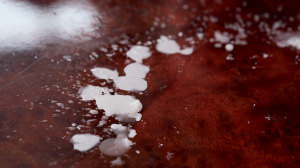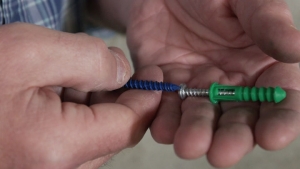How to Create a Walkway with Concrete Pavers
Lead the Way to Your Front Door from Driveway to Stairs with an Attractive Colored Concrete Paver Walkway
Dress up the front of your house by replacing the worn grass that leads to your door with a Do-It-Yourself colored concrete paver walkway that curves from driveway to stairway. Excavate the dirt, build a small retaining wall of heavy landscape timbers, and then most your own concrete paver walkway on a bed of leveled sand.
For More Product Information: visit quikrete.com
Read More
Layout the Position of the Concrete Paver Walkway
Mark the desired curve and position of the concrete paver walkway using stakes and string. Design it based on appearance and ease of use in walking from the steps to the driveway.

Excavate the Base for the Concrete Paver Walkway
Dig up the sod carefully, because you may reuse it on completion of your concrete paver walkway. Loosen the earth with a mattock and shovel it into a container for relocation -- otherwise, you will end up moving it twice.

Make a Level Sand Base for the Concrete Paver Walkway
Line the bottom of the concrete paver walkway foundation with 3 inches of sand and rake it level as a stable base for the concrete pavers. The sand will also promote drainage and avoid water standing on the walkway.

Assemble the Retaining wall beside the Concrete Paver Walkway
Build a retaining wall of 6 by 6 treated landscaping timbers beside the concrete paver walkway. Angle the ends so they fit neatly end-to-end to make turns. Pre-drill pilot holes for landscaping spikes driven to stabilize the timbers.

Form the Stones in the Concrete Paver Walkway
Use a purchased form for shaping the stones in the concrete paver walkway. Set them at a slightly downward angle towards the driveway so that water will run off in that direction to promote draining and prevent puddling.

Mix Fiber-reinforced Mortar for Stones in the Concrete Paver Walkway
Use fiber-reinforced mortar to make stronger pavers for the concrete paver walkway. Add cement color if desired, pouring it into the water and stirring to mix before adding it to the dry concrete mix. Mix with a hoe.

Fill the Stone Form for the Concrete Paver Walkway
Shovel the wet mortar into the stone forms openings. Push it into the shapes with a flat mortar trowel. Tap the form and then lift it straight up to avoid disturbing the shapes. Smooth as necessary with a damp sponge and bevel the edges with your fingers.

Rotate the Form for Each New Concrete Paver Walkway Stone
Rotate the form 90 degrees (a quarter turn) for each new concrete paver walkway stone to stagger the pattern from the adjacent stone. Use the smaller form provided or pour and cut individual stones to turn corners and fill holes.

Finishing the Concrete Paver Walkway
Apply concrete cure and seal while the concrete paver walkway stones are hard but still damp. The following day, when the concrete is dry, brush sand or other stabilizing joint filler between the stones to stabilize them.
Related Tips
Blog Articles
Have You Heard of Landscape Glue?
You love the rustic charm of a gravel walkway, but the constant scattering of stones across your lawn and patio can be a real headache. Whether it’s from pets, lawn mowers, or just foot traffic, it seems impossible to keep those stones in place. Sound familiar? Well, Brian shows us a simple DIY method using landscape glue to keep your gravel path looking pristine and, more importantly, in place.
How to Remove Candle Wax Drips: Two Effective Methods
Candles create a warm and inviting atmosphere, but those pesky wax drips can be a real headache. Luckily, Brian shows us a couple of effective methods to tackle this issue, and they involve two very different temperatures: hot and cold. Here, we'll explore two effective methods: one using cold and the other using heat.
Guide to Hanging on Masonry Walls
Ever wondered how to hang that picture frame or shelf on a brick or concrete wall? It can seem daunting, but with the right tools and techniques, it's a straightforward DIY project. This guide breaks down two common methods: using concrete screws and using anchors, making it easy for you to tackle your next hanging project.








